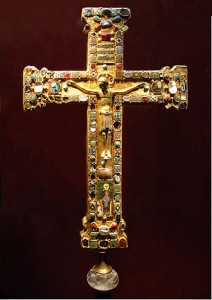“Faithful cross, true sign of triumph, Be for all the noblest tree; None in foliage, None in blossom, None in fruit thine equal be; Symbol of the world’s redemption, For the weight that hung on thee!” 4th verse in Sing, My Tongue the Glorious Battle in Lutheran Service Book, 454.
Here’s the original Latin:
Crux fidelis, inter omnes arbor una nobilis Nulla talem silva profert flore, fronde, germine Dulce lignum dulce clavo dulce pondus sustinens Source: Joseph Sövérffy, Hymns of the Holy Cross: An Annotated Edition with Introduction, (Leiden, 1976), p. 15.
Notice that the modern English version (at least in LSB) did not translate “sweet wood with the sweet nail.” To hear the chant of this text go here: https://www.youtube.com/watch?v=Ww-aOIQKMIc
This verse is from Venantius Fortunatus’s sixth-century hymn, Pange, lingua, gloriosi. Fortunatus’s hymn (and particularly this verse) became a standard part of most Western medieval liturgies associated with devotion of the cross. Often choirs repeated this verse during the adoration of the cross on Good Friday which began with the antiphon:
Behold the wood of the cross on which hung the salvation of the world. O, Come let us adore! (Ecce lignum crucis in quo salus mundi pependit venite adoremus.) The Sarum Missal, Ed. J. Wickham Legg (Oxford, 1916), 113. [My translation]
Medieval preachers focused on Christ’s passion, devotion to the cross, prefigurations of the Christ’s cross in the Old Testament, and the imitation of Christ in their Good Friday sermons. The great twelfth-century theologian, Peter Lombard, included all these elements in long sermon appointed for Good Friday. I will conclude with some of his sermon:
“The serpent suspended on the tree, this is Christ. [He is] a serpent because [he is] mortal. [He is] bronze because [he is] immortal. But [he is] mortal according to the human nature and immortal according to his divine nature. Indeed, humanity fell by the persuasion of the serpent into the condemnation of death. Therefore, it is suitable that the serpent was lifted up on the tree in order to point toward this death. Therefore, what hangs there, unless the death of the Lord?” Patrologia Latina 171:686 {Falsely attributed to Hildebert.} [My translation] Here Lombard referred to Numbers 21:9 and John 12:32.
In another place Lombard emphasized the Christian’s imitation of Christ in the following manner: “Always in this life the Christian ought to hang on the cross, not in the body, but in spirit, not in the flesh, but in the mind so that we may have our bodily members nailed down by the spiritual nails of God’s precepts.” PL 171:691 [My translation] In this way Christ’s crucifixion becomes the pattern for the Christian’s life. For example, Peter stated: “The eyes of Christ were darkened on the cross, so that our eyes may turn away from looking at vain things.” Ibid. [My translation]
Lombard concluded with a proclamation of the praise of the cross similar to Good Friday liturgy: “This is the tree of life, sweet wood, which dried up the tree of death. Therefore, on this tree the God-man was lifted up, so that he who was above all things may draw all to himself.” PL 171:695. [My translation]

